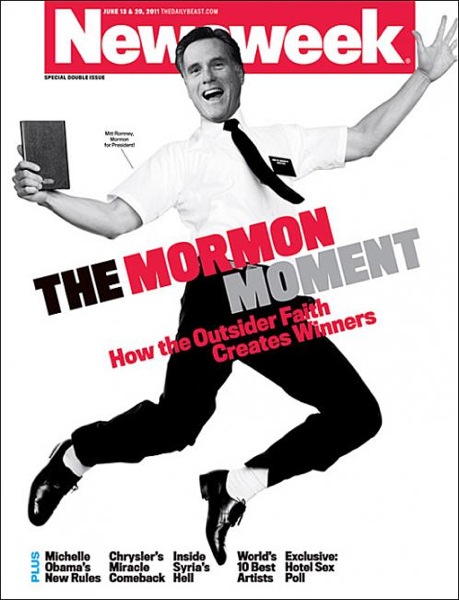
Could Mitt Romney’s religion prevent him from becoming Obama’s challenger? Among Republican voters, there are voices of protest against the beliefs of the favorite in the race for nomination.
“Mormons Rock!” It’s Newsweek that claimed this headline last June. The members of the Church of Jesus Christ of Latter-day Saints have “conquered radio, Broadway and now the Senate.” So why not the White House in November? The idea seems to be growing as Mitt Romney seems the best placed of the Republican candidates to unseat Barack Obama. Fifty-six percent of Mormons consider that Americans are ready to elect a Mormon president, according to a poll by the Pew Research Center published last Thursday.
The favorite of the establishment, victorious in Iowa and New Hampshire, indeed professes this belief along with 5 million other Americans. He even served as a missionary in the late 1960s in France, where 36,000 of the world’s 14 million Mormons currently reside. The LDS is known for its missionaries, its practice of polygamy — rejected in 1890 — and its expertise in genealogy, developed for religious reasons.
The Constitution does not establish religious criteria for defining the eligibility of a candidate. But 35 percent of Americans say they are “at ease” with the idea of a Mormon president, according to a Quinnipiac poll conducted last June. The most reluctant to put their trust in Romney remain the Evangelical Christians, who constitute an important part of the conservative electorate. This is precisely the group he is going to have to win over.
Reluctant Evangelicals
For them, Mormonism remains sacrilegious. Rev. Robert Jeffress, supporter of Mitt Romney’s rival Rick Perry, even called it a “cult” last October. This denomination, which stirs debate in the U.S. and elsewhere, has above all had the inverse effect of that sought by the Evangelical representative Jeffress: Several personalities, such as Glenn Beck (himself a Mormon), have taken the floor to denounce the “bigotry” of Rick Perry and support Mitt Romney, notes Slate.com.
Many of his less famous Evangelical supporters have decided to take their pilgrim’s staff, their keyboards and their computer mice to explain their choice. Their site, EvangelicalsForMitt.org, proposes to skeptics that they overcome their prejudices against him by distinguishing his personal convictions from his political agenda.
Moreover, since the beginning of his political career in the 1990s, he has continued to repeat the phrase “my personal beliefs, like the personal beliefs of other people, should not be brought into a political campaign,” which he first used in a debate for Senate elections in 1994 when he opposed the Democrat Ted Kennedy.
“Can I Vote for a Mormon?”
Back to 2012. “Can I vote for a Mormon?” asks the former prosecutor Ken Starr, like many Americans, in a Washington Post column. A Gallup Poll published last June showed that the Mormon faith of a candidate rejected 22 percent of voters from said candidate’s own camp, much more than in the case of a Hispanic, Jewish or female candidate (less than 10 percent). Only a gay, lesbian or atheist candidate would evoke more rejection in 2012!
Ken Starr responds by bypassing the question. “If the applicant complies with the principles of the U.S. Constitution and swears to defend them, then voters must make their choice based on his qualifications and his political positions, not based on membership in a religious community or not,” he says, noting that John F. Kennedy was Catholic, Thomas Jefferson a deist, and Abraham Lincoln an atheist.
South Carolina, where conservative voters, especially Evangelicals, are crucial, could serve as a test for Romney this Saturday. Four years ago he placed fourth in the Republican primary, with 15 percent of the vote. This year, he is expected to receive 37 percent of the vote according to the latest polls, which predict him as the winner. Before his first two wins in the beginning of January, he struggled to exceed 20 percent, far behind Newt Gingrich, who has quickly faded.
Too Centrist, Too Moderate?
But the main problem might not be his Mormon faith. In South Carolina, as elsewhere, “Mitt Romney could lose votes because of his political moderation more than because of his religion,” said our correspondent in the United States. After the withdrawal of Jon Huntsman, also a Mormon, for Romney’s benefit, he now faces four rivals who attack from the right, trying to shut him in his position of “centrist” and “moderate”. These two adjectives could become strategic advantages against Barack Obama, but for now they are handicaps in the process of selecting the Republican candidate.
The debate that took place Monday night in Myrtle Beach illustrated Mitt Romney’s problem. Among the attacks that came from all sides, there is the implication of his personal fortune, his work as head of the investment fund Bain Capital… but no allusion to his faith.

Leave a Reply
You must be logged in to post a comment.